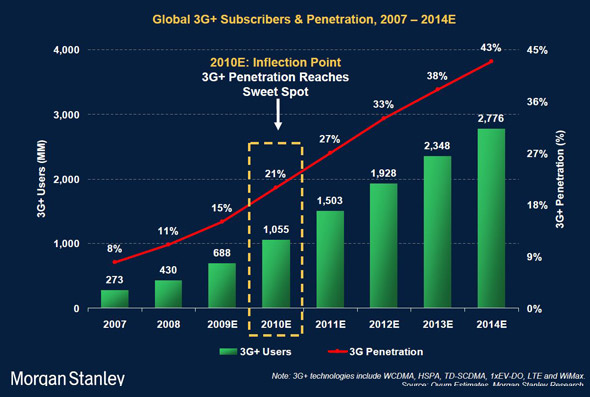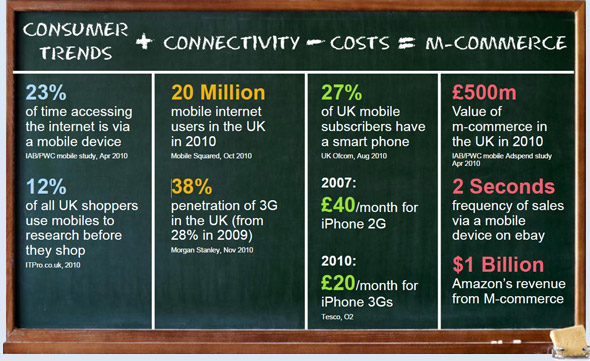With ever evolving technology designed to aid and entertain us at every turn, one area has experienced a major period of growth. Mobile phone technology, with the addition of mobile internet access, has expanded over the last few years to a point where we no longer use our phones simply to make calls but to send messages, share photos and video footage and have access to m-commerce products and services whilst on the move. But what do all these changes mean for businesses and retailers? Are we making use of mobile website design to help keep up with the latest formats and consumer usage?
Once used as an easy way to keep in touch with the office, or friends and family whilst away from home, over the last ten years or so the mobile phone has had us texting via SMS, then sending emails and transferring photos. More recently, the introduction of smartphones has meant we are able to access the internet, download music, stream TV and of course, shop online using m-commerce sites whilst on the go. With mobile broadband becoming a growing market and with investment in 3G and 4G networks for better coverage and service, being able to go online using your phone has become a popular choice for many consumers.
The rise of smartphones has been phenomenal, with popular handsets such as the Apple iPhone pushing the limits on what our simple mobile phone can achieve. With many other technology companies following suit, mobile website development and m-commerce is in demand by consumers, but are businesses and retailers alike ready for this format?
A recent study by Morgan Stanley shows that in the next five years, more people will be connecting to the internet via mobile devices than on their PCs. The boom in social networking sites such as Facebook and Twitter and m-commerce sites has changed the way people use the internet and have put new mobile touch screen technology in demand. The ability to get online whenever and wherever we are has meant that businesses must now reconsider their websites and offer something that fits with the mobile commerce generation.

Mobile website designers understand that consumers are now able to browse mobile commerce sites on the go, 24 hours a day and they also realise that the smartphone format is different to the normal view you would have on your computer at home. This means that mobile website development needs to be approached in a slightly different way to regular website design. A mobile websites agency would be able to look at your company’s needs, be it to provide service information, news or m-commerce and design a site that not only complements your current site or brand proposition, but works just as hard as your existing website.
Currently, smartphones can be used to view websites that have been designed for viewing on a larger screen format such as a computer or laptop, the obvious differences being that a smartphone screen is much smaller and reading text or viewing images can become a problem. Mobile website designers know that mobile optimised sites can outperform non-optimised sites, especially where m-commerce sites are concerned. Difficulties in viewing their desired product properly or navigating through to the right information on an m-commerce site can put customers off. As most mobile website designers will tell you, consumers are focused on their task and are easily frustrated by sites that are slow to load or hard to navigate.
Mobile website development is essentially similar to regular website development, especially when it comes to m-commerce, with the main areas of look, navigation, product pages, shopping basket and ordering being the most important for consumers to be able to use. Retailers are realising the importance of having just as good a mobile commerce site as a regular site and are working with mobile website designers to produce sites that fit in with this new method of shopping.

Working with a mobile website agency can make the design of your mobile commerce site a lot easier. After all, they are the experts and can help you identify what will work well within your m-commerce site. In recent mystery shopping investigations, they showed that there were certain areas where mobile website designers should concentrate, such as the ‘look’ of the homepage. Feedback from the investigations said that many mobile commerce sites looked too plain and often didn’t correspond to other online presences that the company had. Your mobile website agency will tell you that brand is important and if you already have a developed look and feel that a consumer will identify with, you should use that as the base of your design. Remember, due to the small screen view, usability is key, but don’t let your customers forget they are visiting you.
Navigation and search options are also important in mobile website development. Just like non-optimised websites, you need to let customers get where they want to go in as few clicks as possible, so make all your navigation options as simple, obvious and easy to use as possible. Having a keyword search bar is a good idea, but make sure the results it gives are relevant to the search. If a consumer is frustrated by not getting where they want to go, they will look for their product elsewhere. When it comes to mobile commerce, most consumers know exactly what they are looking for, unlike via a PC format where the consumer may be more tempted to browse.
M-commerce sites often suffer because their product information is lacking. Just because you have a smaller viewing screen doesn’t mean you can scrimp on product information. In fact, during the mystery shopping investigation, a lot of the feedback related to sites not providing enough detailed descriptions or variety of images. Many of the better m-commerce sites offered full descriptions, more images and access to customer reviews via links on the product page.
The shopping basket and checkout area also needs to work in a similar way to a regular site, with as much flexibility as you can possibly get in a smaller format. Feedback from shoppers has mentioned simple things like being able to add or delete items easily and making your purchase obvious with a picture and brief description. Mobile website designers will be able to advise on all these areas and make them work well within the format.
When it comes to mobile commerce, simplicity is the key, especially when keyboards are generally small and fiddly to use. In the checkout area, you can help by offering time saving ideas such as postcode address finders and one-click payment options like Paypal.
Of course, it isn’t just retailers that need to pay heed to the new way of accessing the internet and using m-commerce. All businesses should be considering just how their clients use their site and how they might be hindered by the current format or design. Regardless of whether you are using m-commerce or generating sales leads through your site, a mobile website agency can make your site mobile ready and help you to move forward.
A mobile website agency can help you design your site to work seamlessly regardless of the technology format it is viewed on, with clear, consistent navigation, obvious call to action signs and thorough branding. A good agency will take time to learn about your business and your clients to produce a site that works hard for you.
No doubt, m-commerce like the technology it is used on, will continue to grow and evolve and provide even more exciting opportunities for retailers and businesses to extend their brands to consumers.
